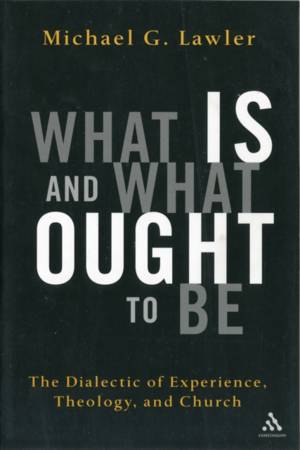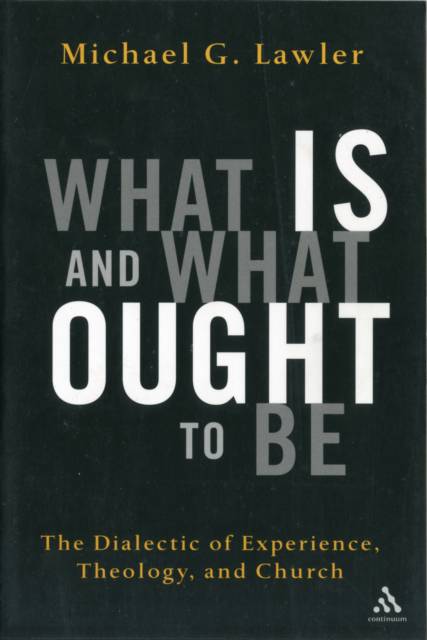
Bedankt voor het vertrouwen het afgelopen jaar! Om jou te bedanken bieden we GRATIS verzending (in België) aan op alles gedurende de hele maand januari.
- Afhalen na 1 uur in een winkel met voorraad
- In januari gratis thuislevering in België
- Ruim aanbod met 7 miljoen producten
Bedankt voor het vertrouwen het afgelopen jaar! Om jou te bedanken bieden we GRATIS verzending (in België) aan op alles gedurende de hele maand januari.
- Afhalen na 1 uur in een winkel met voorraad
- In januari gratis thuislevering in België
- Ruim aanbod met 7 miljoen producten
Zoeken
What Is and What Ought to Be
The Dialectic of Experience, Theology, and Church
Michael G Lawler
Paperback | Engels
€ 88,45
+ 176 punten
Omschrijving
The genesis of this book was sown in 1961 in a seminar on theological method under the guidance of Bernard Lonergan. Lonergan was convinced that something new was happening in history, and that a living theology required a new theological approach.
In this book, Michael Lawler is concerned with three characteristics of this new approach: that theology must be historical, empirical, and in interdisciplinary collaboration with the social sciences. The book thus explores the relationship between practical theology (which is concerned with the church as it is and as it ought to be) and sociology, and specifically the theological realities of sensus fidei and reception. The exploration is concretized by a consideration of the sociological data and theology of two Catholic moral doctrines: artificial contraception and divorce and remarriage without prior annulment.
In addition to being a useful primer on the relationship between theology and sociology (both theoretical and empirical), the book provides a wonderfully clear description of the sea-changes that have occurred in Roman Catholic theology worldwide over the past 70 or so years. Among those elements are the turn to the subject; the sociology of knowledge; the distinctions between uncreated and created grace and between original and dependent revelation; a complex, non-fundamentalist understanding of Sacred Scripture; the preferential option for the poor; the notion of the church as communion rather than hierarchy; and, finally, the necessity for church teaching to be "received," accepted, by the whole church. If a Catholic Rip Van Winkle had fallen asleep 40 or 50 years ago, he would read this book, upon opening his eyes, with amazement.
In this book, Michael Lawler is concerned with three characteristics of this new approach: that theology must be historical, empirical, and in interdisciplinary collaboration with the social sciences. The book thus explores the relationship between practical theology (which is concerned with the church as it is and as it ought to be) and sociology, and specifically the theological realities of sensus fidei and reception. The exploration is concretized by a consideration of the sociological data and theology of two Catholic moral doctrines: artificial contraception and divorce and remarriage without prior annulment.
In addition to being a useful primer on the relationship between theology and sociology (both theoretical and empirical), the book provides a wonderfully clear description of the sea-changes that have occurred in Roman Catholic theology worldwide over the past 70 or so years. Among those elements are the turn to the subject; the sociology of knowledge; the distinctions between uncreated and created grace and between original and dependent revelation; a complex, non-fundamentalist understanding of Sacred Scripture; the preferential option for the poor; the notion of the church as communion rather than hierarchy; and, finally, the necessity for church teaching to be "received," accepted, by the whole church. If a Catholic Rip Van Winkle had fallen asleep 40 or 50 years ago, he would read this book, upon opening his eyes, with amazement.
Specificaties
Betrokkenen
- Auteur(s):
- Uitgeverij:
Inhoud
- Aantal bladzijden:
- 224
- Taal:
- Engels
Eigenschappen
- Productcode (EAN):
- 9780826417046
- Verschijningsdatum:
- 5/04/2005
- Uitvoering:
- Paperback
- Formaat:
- Trade paperback (VS)
- Afmetingen:
- 153 mm x 229 mm
- Gewicht:
- 326 g

Alleen bij Standaard Boekhandel
+ 176 punten op je klantenkaart van Standaard Boekhandel
Beoordelingen
We publiceren alleen reviews die voldoen aan de voorwaarden voor reviews. Bekijk onze voorwaarden voor reviews.









